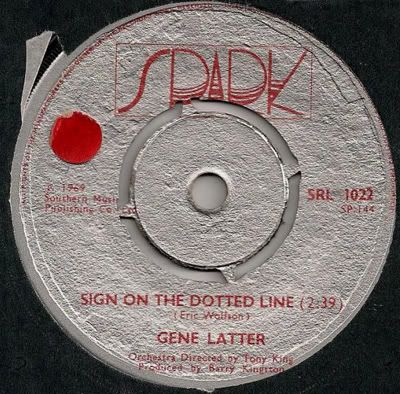Label: Hot Biscuit Disc Company
Year of Release: 1967
The Epic Splendor were formed from the ashes of the New York based act Little Bits of Sound, and we've already covered their excellent and supremely under-rated single "It Could Be Wonderful" elsewhere on this blog. They were signed to the short-lived (and million dollar funded) US Capitol subsidiary Hot Biscuit and this was the first single the label issued.
"A Little Rain Must Fall" is generally treated with either huge enthusiasm or shrugging indifference by a lot of collectors these days, being regarded as a lost Northern Soul floor-filler by some commenters, or a slice of summery, breezy bubblegum by others. For my money, it's a beautiful, life-affirming little disc and I'd actually spent the last few years looking for a copy at a reasonable price. The lyrics are filled with gentle picture poster philosophy, filled to the brim with observations about how a "little rain must fall" before we get to enjoy the sunshine, but it's delivered with such spring and zest, and such an uptempo light soul arrangement, that it does indeed mirror the heartbreak and the passion necessary for a top northern soul spin. Its slightly gentle production may doom it for some in this respect, though - I can fully understand how it won't (and doesn't) win the rubber stamp of approval from everyone.
The B-side "Cowboys and Indians", on the other hand, is sneery outsider psychedelic pop about the marginalised life of a man with an alternative lifestyle, at total odds with the top side. "I suppose the way I live would blow people's brains/ but then the way they live has always blown mine" sneers the vocalist, bringing back images of an "Easy Rider" character on the dusty highway.
Whatever you expect from sixties music, either the A-side or the B-side is bound to be a winner for you.
Aside from this and "It Could Be Wonderful", there were no other releases from the Epic Splendor. "A Little Rain Must Fall" started out seeming like a likely hit, but in the end only managed to climb to number 87 in the Billboard Chart. An injustice, but the late sixties were flooded with so many astonishing records that it was far from the only one.
Label: Hot Biscuit Disc Company
Year of Release: 1967
The Epic Splendor were formed from the ashes of the New York based act Little Bits of Sound, and we've already covered their excellent and supremely under-rated single "It Could Be Wonderful" elsewhere on this blog. They were signed to the short-lived (and million dollar funded) US Capitol subsidiary Hot Biscuit and this was the first single the label issued.
"A Little Rain Must Fall" is generally treated with either huge enthusiasm or shrugging indifference by a lot of collectors these days, being regarded as a lost Northern Soul floor-filler by some commenters, or a slice of summery, breezy bubblegum by others. For my money, it's a beautiful, life-affirming little disc and I'd actually spent the last few years looking for a copy at a reasonable price. The lyrics are filled with gentle picture poster philosophy, filled to the brim with observations about how a "little rain must fall" before we get to enjoy the sunshine, but it's delivered with such spring and zest, and such an uptempo light soul arrangement, that it does indeed mirror the heartbreak and the passion necessary for a top northern soul spin. Its slightly gentle production may doom it for some in this respect, though - I can fully understand how it won't (and doesn't) win the rubber stamp of approval from everyone.
The B-side "Cowboys and Indians", on the other hand, is sneery outsider psychedelic pop about the marginalised life of a man with an alternative lifestyle, at total odds with the top side. "I suppose the way I live would blow people's brains/ but then the way they live has always blown mine" sneers the vocalist, bringing back images of an "Easy Rider" character on the dusty highway.
Whatever you expect from sixties music, either the A-side or the B-side is bound to be a winner for you.
Aside from this and "It Could Be Wonderful", there were no other releases from the Epic Splendor. "A Little Rain Must Fall" started out seeming like a likely hit, but in the end only managed to climb to number 87 in the Billboard Chart. An injustice, but the late sixties were flooded with so many astonishing records that it was far from the only one.








